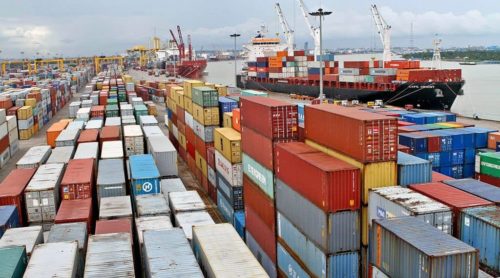Customs Insists on Duty Benchmark, Blames Importers for Fraudulent Practices

Container depot
*Claims 90% automation of activities
*Generates N2.3trillion
By Francis Ugwoke
The policy on duty benchmarking on imported goods announced few months ago by the Nigeria Customs Service (NCS) remains the only way to check fraudulent declarations by importers, the Service said on Monday.
Accusing the importers of failure to comply with trade regulations, the Service said duty benchmarking was the only way out of such bad situation.
The Apapa Customs Command Controller, Comptroller of the Mr Yusuf Malanta and the Deputy National Public Relations Officer of the NCS, Mr Timi Bomodi both defended the duty benchmarking on imported goods.
According to the two, the Customs Service has in its system data range on prices of goods internationally as guide.
They argued that the policy of benchmarking followed the cases of under-declaration, under-invoicing and concealment of goods by importers.
Bomodi who spoke at a press conference in Apapa said compliance was simply about honesty and transparency which according to him have been lacking among the importers.
He added that officers of the Service were not witch hunters who would want traders to suffer, insisting that what is expected is just for the importers and their agents to be transparent in their goods declarations as it makes the job easier.
He disclosed that the experience right now was that on seeing any declaration, it would not be difficult to know within two minutes if there was anything fishy about the declaration.
He said that what this means is that for a job that takes few minutes to execute, because one has to dig deeper and deeper, such jobs take a long time.
The Service however could not address the issue of inflation that benchmark could impose on the national economy and the hardship it will bring to Nigerians.
“The WCO nomenclature and the explanatory notes to the tariff are further guides which help agents and importers classify their goods correctly. In spite of this, the NCS has noticed both a huge knowledge deficit on the side of some agents/importers and an inclination towards misrepresenting facts with the obvious intention of evading the payment of appropriate customs duty. The valuation of goods is another area that has often drawn criticism from certain quarters. Indeed there is no market in the world where prices remain static over time. Same is true for other components of customs value which includes insurance and freight charges. When we add the ever increasing rate of exchange into the mix, the inevitable result has to be commensurate increases in the value component of declared items used for calculating duty. Therefore situations where some insist on declaring fictitious values for customs purposes will always be met with adjustment reflecting current realities”.
Under the policy every 20ft or 40ft container pays a uniform duty rate irrespective of the value of the imported goods, a development that has been described as not done anywhere in the world.
This was part of an internal directive issued sometime in September 2021.
Observers believe that the idea is to achieve a multiplier revenue generation for the Customs Service.
But freight forwarders said the measure exposes the Customs Service as towing the line of illegality and unprofessionalism for the sake of more revenue generation without considering the consequences on Nigerians.
Former President of the National Association of Government Approved Freight Forwarders (NAGAFF), Dr. Eugene Nweke while condemning the decision said it will trigger inflations and bring more harm to the ailing economy.
Nweke said the CGC should save Nigerians such hardship and halt the internal directive on the planned duty benchmarking.
Meanwhile, Bomodi said the Customs Service has integrated and automated over 90 percent of its activities.
He announced that the e-customs project which is certain to take off next year will provide end to end automation aimed at eliminating physical contact and the potential for subjective judgments based on unethical consideration.
He said fast track and authorized economic operator schemes were there to enhance and facilitate the experience of traders with track records for honesty and transparency.
Bomodi also disclosed that the Service recorded so far the sum of N2.3trillion revenue which is higher than the 2021 target of N1.679 trillion.
